CHICAGO: While the US presidential debate between Kamala Harris and Donald Trump on Tuesday night demonstrated sharp contrasts on major issues, experts suggest it may have done little to sway undecided voters, including those in the Arab American community.
“I don’t think this debate is going to tell us a lot about the results of the election,” Amal Mudallali, the former Lebanese ambassador to the UN, told “The Ray Hanania Show” on Wednesday.
“Neither side succeeded in bringing Arab Americans in or convincing them that he’s the one or she’s the one that will be better for them as president and will take their interests into account.”
Also speaking on Wednesday’s show, Joseph Haboush, Washington correspondent at Al Arabiya English, even called the debate “a bit bland overall.”
He said: “I’m not sure that there are any undecided voters that would change their minds based on last night’s performance.”
The debate, which was held less than two months before election day on Nov. 5, marked the first direct confrontation between the Democratic vice president and the former Republican president.
For Harris, the debate represented an opportunity to solidify her leadership after replacing President Joe Biden on the Democratic ticket after his poor debate performance in June forced him to step aside.

Democratic presidential candidate Kamala Harris (R) shakes hands with her Republican rival Donald Trump during the presidential debate at the National Constitution Center in Philadelphia, Pennsylvania, on Sept. 10, 2024. (AFP)
Trump, on the other hand, saw the debate as an opportunity to link Harris to the perceived failures of the Biden administration, particularly around democracy, immigration, and the economy.
“I was a bit surprised that they didn’t delve into more policy-related issues in more detail, on what either side would want to do,” said Haboush.
“It was more, I would say, fear-mongering; both sides accusing the other of trying to portray the other as a threat to any future of the US, be it democracy or on other issues that they were both accusing one another of.
“There wasn’t much more that was said or given to the audience that they didn’t already know.”
However, foreign policy issues, such as Ukraine, Gaza, China, and Afghanistan, were mentioned in the debate.
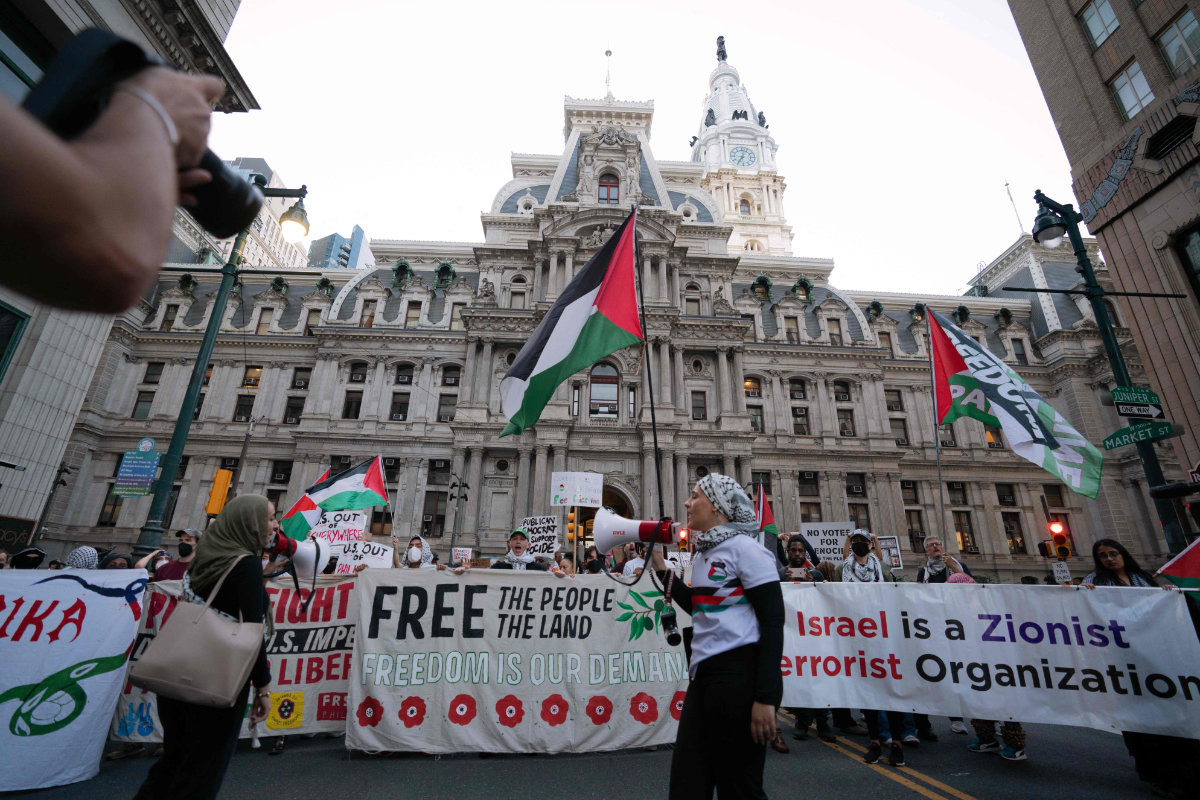
Pro-Palestinian demonstrators block roads as they rally in front of Philadelphia City Hall in Pennsylvania on Sept. 10, 2024, ahead of the Harris-Trump debate. (AFP)
On Ukraine, Trump criticized Biden’s handling of the war and promised to end the conflict, claiming that it would not have occurred had he been president.
Pledging to “settle” the conflict even before taking office, Trump said: “What I’ll do is I’ll speak to one and I’ll speak to the other. I’ll get them together.”
He added: “I know (Ukrainian President Volodymyr) Zelensky very well, and I know (Russian President Vladimir) Putin very well. They respect me. They don’t respect Biden.”
Harris attacked Trump’s perceived coziness with Putin, stating that the Russian leader would “eat you for lunch,” and accused him of undermining American support for Ukraine — a key concern given Trump’s ambiguous stance on the conflict.
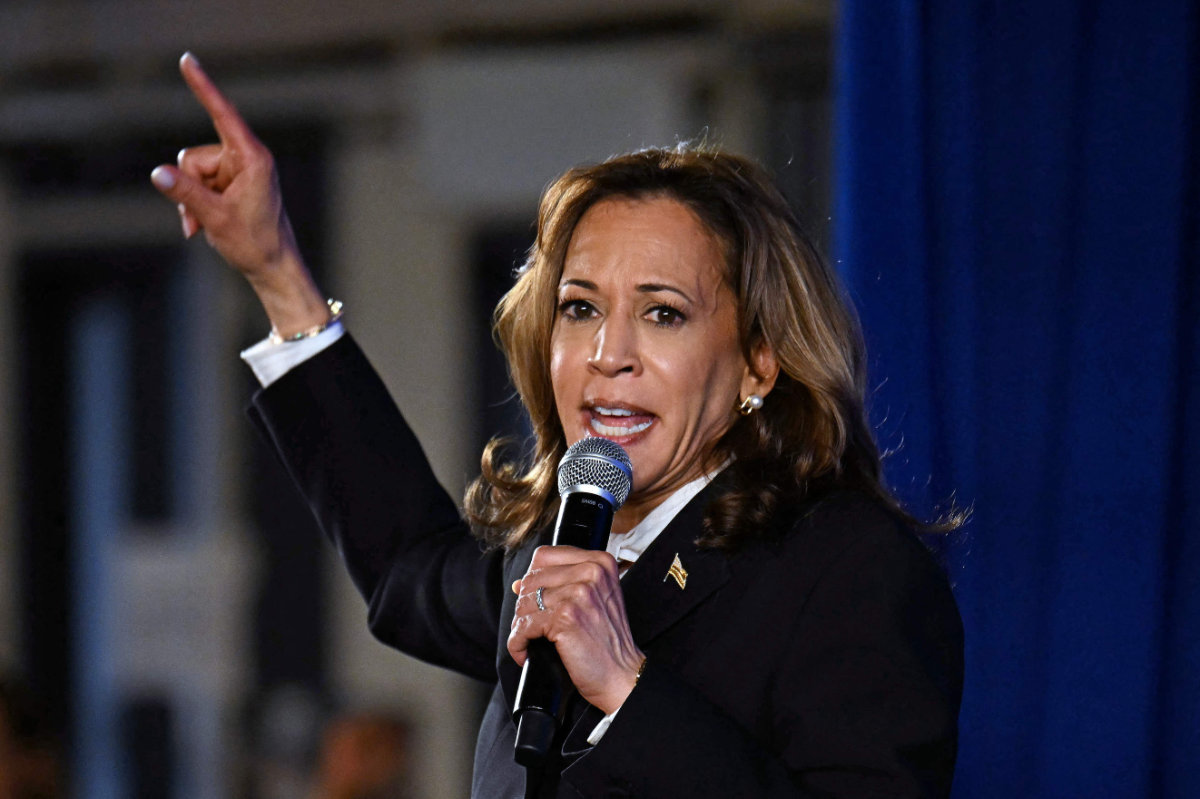
Kamala Harris slams Donald Trump for being in league with the world's dictators. (AFP)
She defended the Biden administration’s support for Kyiv, highlighting US military aid as essential to Ukraine’s continued independence.
“Because of our support, because of the air defense, the ammunition, the artillery, the Javelins, the Abrams tanks that we have provided, Ukraine stands as an independent and free country,” she said.
However, Harris did not propose new strategies for future US involvement.
Trump hit back, accusing Harris of being weak on foreign policy and of hating Israel and Arabs. He offered no specific solutions for the Israel-Hamas conflict, however, instead claiming the war in Gaza would not have happened under his leadership.
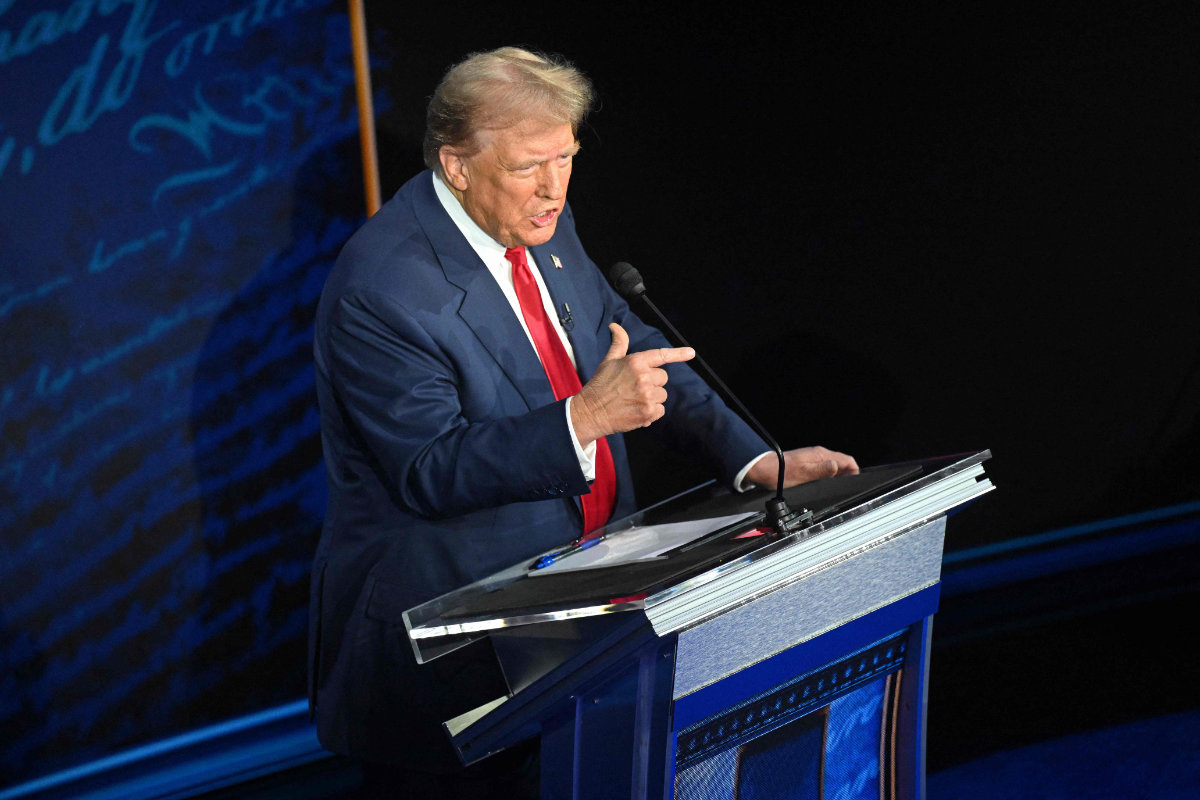
Donald Trump said the Russian invasion of Ukraine and the war in Gaza would not have happened if he were the president. (AFP)
He said: “She hates Israel. She wouldn’t even meet with (Israeli Prime Minister Benjamin) Netanyahu when he went to Congress to make a very important speech.” While Harris did skip the speech, she did meet Netanyahu the following day.
“If she’s president, I believe that Israel would not exist within two years from now,” Trump added, going on to say Harris also hates Arabs, claiming that “the whole place (the Middle East) is going to get blown up.”
He added: “Look at what’s happening with the Houthis and Yemen. Look at what’s happening in the Middle East. This would have never happened. I will get that settled, and fast, and I will get the war with Ukraine and Russia ended.
“If I’m president-elect, I’ll get it done before even becoming president.”

People gather outside of the Berkeley Art Museum and Pacific Film Archive in Berkeley, California, to watch the Harris-Trump debate. (San Francisco Chronicle via AP)
Harris, meanwhile, affirmed her support for Israel’s right to defend itself against Iran and its proxies, while acknowledging the heavy civilian toll on Palestinians in Gaza, where 11 months of fighting have left some 42,000 people dead, according to Gaza’s Health Ministry.
“Far too many innocent Palestinians have been killed,” she said.
She reiterated her support for the two-state solution and emphasized the importance of both Israeli security and Palestinian self-determination. Gaza, however, may not be a deciding issue in the election, even among Arab Americans.
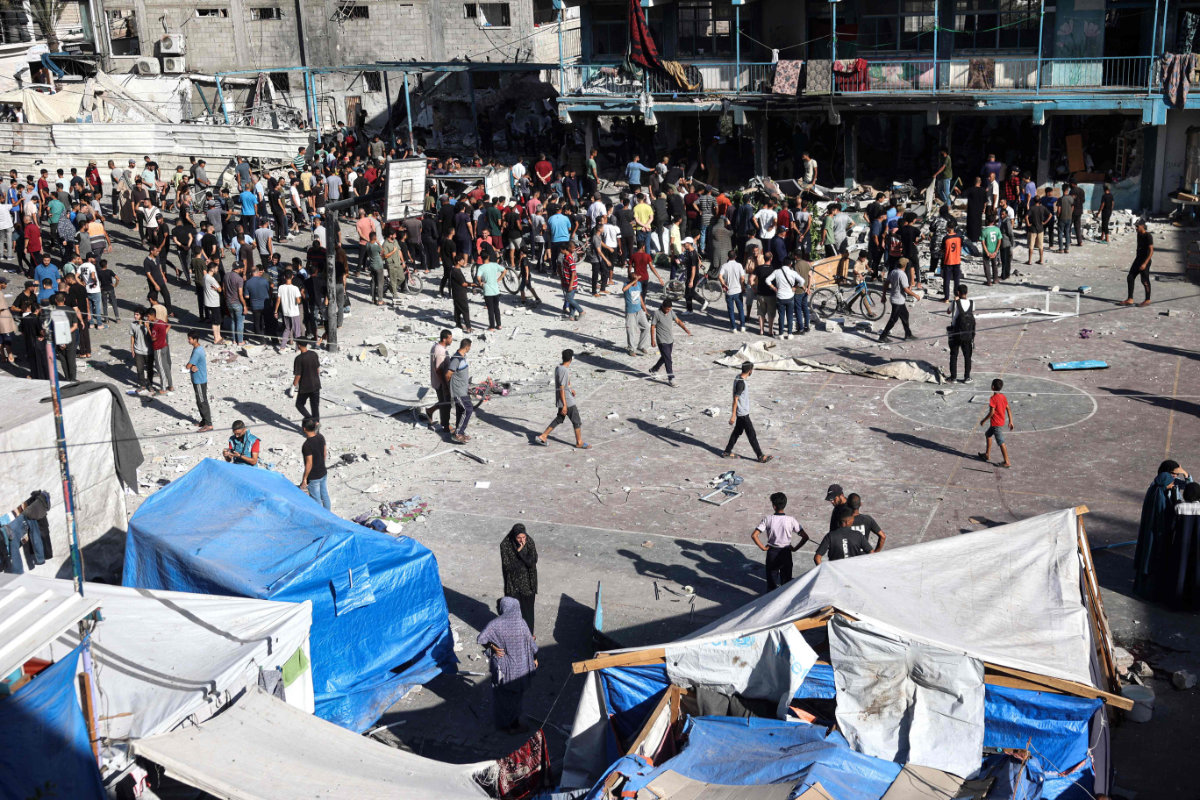
Hours after the Harris-Trump debate in which the Gaza war was discussed, an Israeli air strike hit a school in Nuseirat, Central Gaza, ckilling at least 34 people. (AFP)
“I don’t think Arab American voters are a monolith. It’s not all of them voting on one single issue,” Joyce Karam, a senior news editor at Al-Monitor, told Wednesday’s program.
“I have Arab American friends who have prioritized the war in Gaza and some of them are going for a third party candidate.”
She added: “I think it would not be fair to the community to just say this is a ‘one vote’ or ‘one priority’ kind of drive.”
In relation to China, the candidates sparred over tariffs and trade. Trump promised sweeping tariff increases on Chinese goods, while Harris criticized these measures, citing concerns over inflation and economic instability.
Afghanistan also featured briefly in the debate, with Harris standing by Biden’s decision to withdraw US troops in August 2021, while Trump criticized the manner in which the withdrawal was executed.
Both candidates blamed each other for the chaotic aftermath and the Taliban’s return to power.
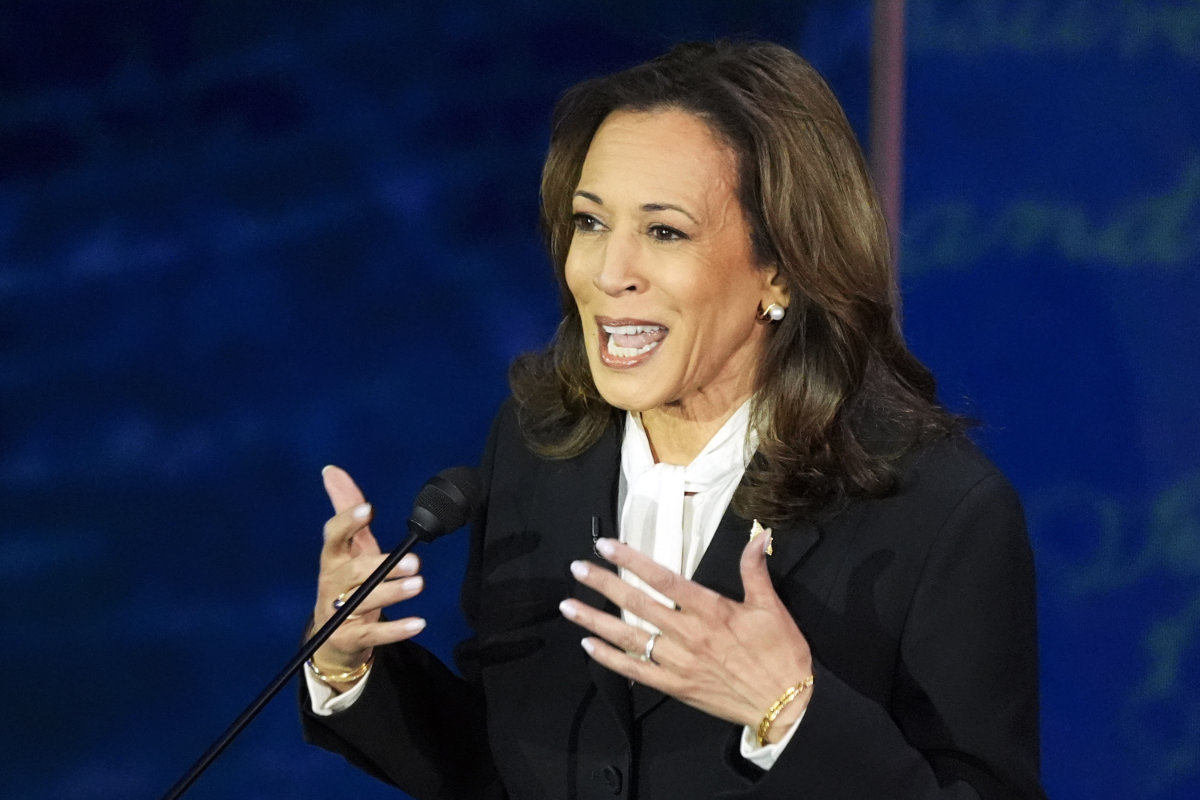
Kamala Harris’ calm demeanor was in stark contrast to Trump’s frequent interruptions and emotional outbursts. (AP)
One of the standout features of the debate was the contrast in the candidates’ delivery. Harris’ calm demeanor was in stark contrast to Trump’s frequent interruptions and emotional outbursts, which included raising his voice and launching personal attacks.
Harris’ ability to maintain her composure in the face of Trump’s barrage of insults seemed to play well with viewers. A CNN snap poll conducted after the debate found that 63 percent of respondents believed Harris had won, compared to 37 percent who favored Trump.
Online prediction market PredictIt’s 2024 presidential general election market showed Trump’s likelihood of victory declining during the debate, while Harris’ odds rose to 55 percent from 53 percent.
The debate may prove to be a pivotal moment for both campaigns. In the immediate aftermath, Harris’ campaign capitalized on her performance by calling for a second debate, challenging Trump to meet her again in October.

Donald Trump speaks to reporters in the spin room after the debate. (AP)
Trump, however, appeared reluctant to commit, claiming he had already won the debate and dismissing the idea of a rematch. But his appearance in the debate “spin room” afterwards suggested that even he recognized it had not gone as planned.
Perhaps the most poignant takeaway from the debate was the reminder that, as important as US foreign policy decisions are for the rest of the world, it is domestic issues that swing elections.
“We really don’t know what could happen. There could be many surprises to come,” said Karam. “It’s also very important to remind our audience in the Middle East that while the Gaza war is important, it’s not going to be the deciding factor for many voters.”
“This debate was not a debate that focused on the substance of the issues, it was much more stylistic and about who came off as presidential,” Senior Fellow at the Middle East Institute Firas Maksad told Arab News.
Summing up, Firas Maksad, senior fellow at the Washington-based Middle East Institute, told Arab News: “This debate was not a debate that focused on the substance of the issues. It was much more stylistic and about who came off as presidential.”

Left to right, Arab media practitioners Amal Mudallali, Joseph Haboush and Joyce Karam.





















